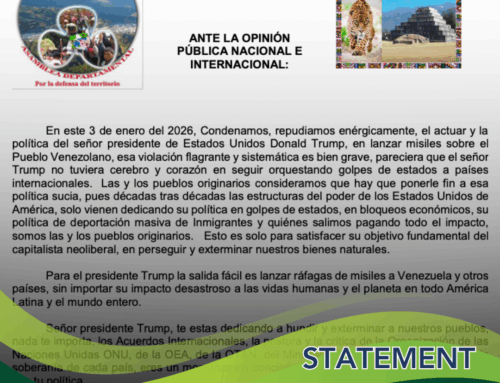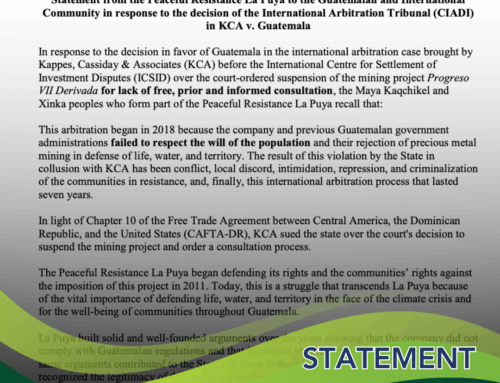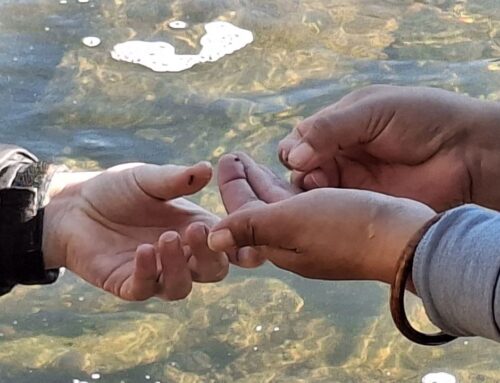More than one year after President Molina declared a state of siege in Santa Cruz de Barillas, repression continues against community leaders resisting the Cambalam hydroelectric project, operated by Spanish owned Hidro Santa Cruz. Violence and criminalization against leaders defending territory and the right to self determination has been on the rise in Barillas since the 2007 community consultation rejecting large-scale development projects in their territory.
Since March, NISGUA has reported on the detention of Rubén Herrera, community leader and member of the Departmental Assembly of Huehuetenango for the Defense of Natural Resources (ADH). Herrera has been unjustly imprisoned for more than two months on trumped up charges related to resistance to the Cambalam project. Despite requests by Guatemala’s Public Prosecutor to dismiss the case due to a lack of evidence, the judge ordered the case forward.
In response, NISGUA together with the Guatemala Human Rights Commission, gathered more than 2,800 signatures from 52 countries demanding Rubén’s immediate release and an end to the criminalization of human rights defenders.
 |
| Rubén Herrera, unjustly imprisoned since March 15 |
The signatures were delivered to Guatemala’s Public Prosecutor’s office in anticipation of Rubén’s May 30 pre-trial hearing. Originally slated to be heard in Santa Eulalia, Huehuetenango, Rubén’s hearing was recently transferred to Guatemala City.
“The decision of the Supreme Court to transfer Rubén Herrera’s case to Guatemala City is a favorable resolution because it is an opportunity for the case to be heard in a specialized court, which gives us greater confidence that the false accusations presented by the Hidro Santa Cruz will be disproven,” stated Alba Cecilia Mérida, Herrera’s life partner and human rights activist. “It means that Rubén will have a greater possibility of due process in the application of justice.”
 |
| May 1 march in Huehuetenango: “No More Repression, Liberty for Rubén Herrera” |
In April, the persecution of leaders resisting the Cambalam project continued with the kidnapping and murder of Daniel Pedro Mateo, cultural leader and prominent defender of the 2007 community consultation in Barillas. Community members from eight municipalities in northern Huehuetenango mobilized during three days in order to locate Pedro Mateo’s remains.
Just a few weeks later, terror once again gripped residents of Barillas when community leader Mynor López was detained by plain clothed men, later determined to be police officers, and forced into an unmarked vehicle. Some residents, believing López was being abducted, mobilized to ensure his release. In response anti-riot police already in the community fired at the crowd with tear gas. In a press release, the ADH denounced the irregular detention of Mynor López as well as the ongoing criminalization of leaders.
The state’s pattern of
systematic criminalization and persecution of community leaders defending territory was demonstrated again in early April when President Molina implemented of another
state of siege in four municipalities surrounding Tahoe Resources’ Escobal project, located in San Rafael Las Flores, Santa Rosa. As in Barillas, leaders demanding the right to consultation have been targeted; 12 members of the committee organizing community referenda in San Rafael Las Flores had their homes raided and searched during the weeks long state of siege.
“Instead of listening to the legitimate demands of the people, the state and the companies have implemented a strategy to discredit and delegitimize peaceful community struggles in defense of life and territory,” said Francisco Rocael Mateo of the ADH. “This criminalization is a strategy to demobilize community resistance.”
Read NISGUA’s full press release in English and Spanish.
NISGUA works closely with the Departmental Assembly of Huehuetenango (ADH) in their efforts to promote self-determination and alternative visions of development in the highland department of Huehuetenango. The ADH receives international human rights accompaniment from NISGUA through the ACOGUATE project and participated in NISGUA’s 2010 tour.








Leave A Comment